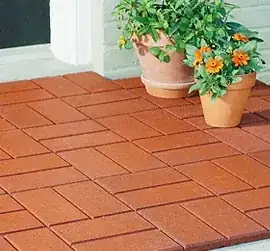My wife is disabled with Cerebral Palsy and therefore can’t walk on ice or snow, so we must be able to use lots of de-icing salt on our front path. We would like to replace the paving with something that looks nicer. What are our options?
-
What do you have now? "Paving" to me would be asphalt but I'm not sure if we're being separated by a common language... – bstpierre Jun 16 '11 at 11:37
-
@bstpiere, we have basic plain pre-cast concrete paving flags – Ian Ringrose Jun 16 '11 at 11:52
-
There are paving stones with rough or bobbly surfaces - would this make it easier for her? – winwaed Jun 16 '11 at 14:09
-
@Winwaed the issue is that most paving stone makers say you must not use deicing salt as they claim it damages nice paving stones. – Ian Ringrose Jun 16 '11 at 14:34
-
I wonder why? Concrete and cement are often used in salt environments. Yes road salt can be a problem with concrete bridges, but that is due to salt water reacting with the steel reinforcements - something paving stones don't have. – winwaed Jun 16 '11 at 14:53
-
@winwaed there is a reason they are continuously repaving chicago and other areas in the north. The salts they use in deicers can be damaging to road and other concrete surfaces. – wax eagle Nov 03 '11 at 12:14
-
1@waxeagle - even road surfaces have reinforcing which will corrode with salt. The rust expands, cracking the concrete. A concrete driveway would have the same problem, but paving stones shouldn't? (no iron bars to corrode) – winwaed Nov 03 '11 at 13:31
2 Answers
Recycled rubber pavers might be a good option, they are soft, reasonably priced and are supposed to last a long time.
They also come in shapes and sized that closely resemble concrete or brick.

- 9,141
- 5
- 37
- 83
Perhaps pre-sealed pavers/bricks (but I really like the rubber paver option above).
Having never lived in a place where icing of pavements is more than a 10-minute problem, I'd never really thought much of this issue before. If I understand correctly, the problem is where the concrete absorbs saline water via capillary action which then causes the concrete paver to fret, distort or crack due to expansion/contraction of water inside plus the increase in pH (which in turn draws in more water).
Some brief research tells me that a plethora of products exist to seal pavers which contain or silicon a similar substance, filling air gaps and repelling water. I presume it must be possible to buy pavers that have been pre-treated with such a product if you're willing to pay extra for it. A quick google search confirmed dozens of such options exist in Australia at least so there must be loads of competition in the US. And, evidently, the resilience of such concrete pavers is further enhanced by applying extra sealant after the paving is laid.
- 4,912
- 4
- 30
- 45